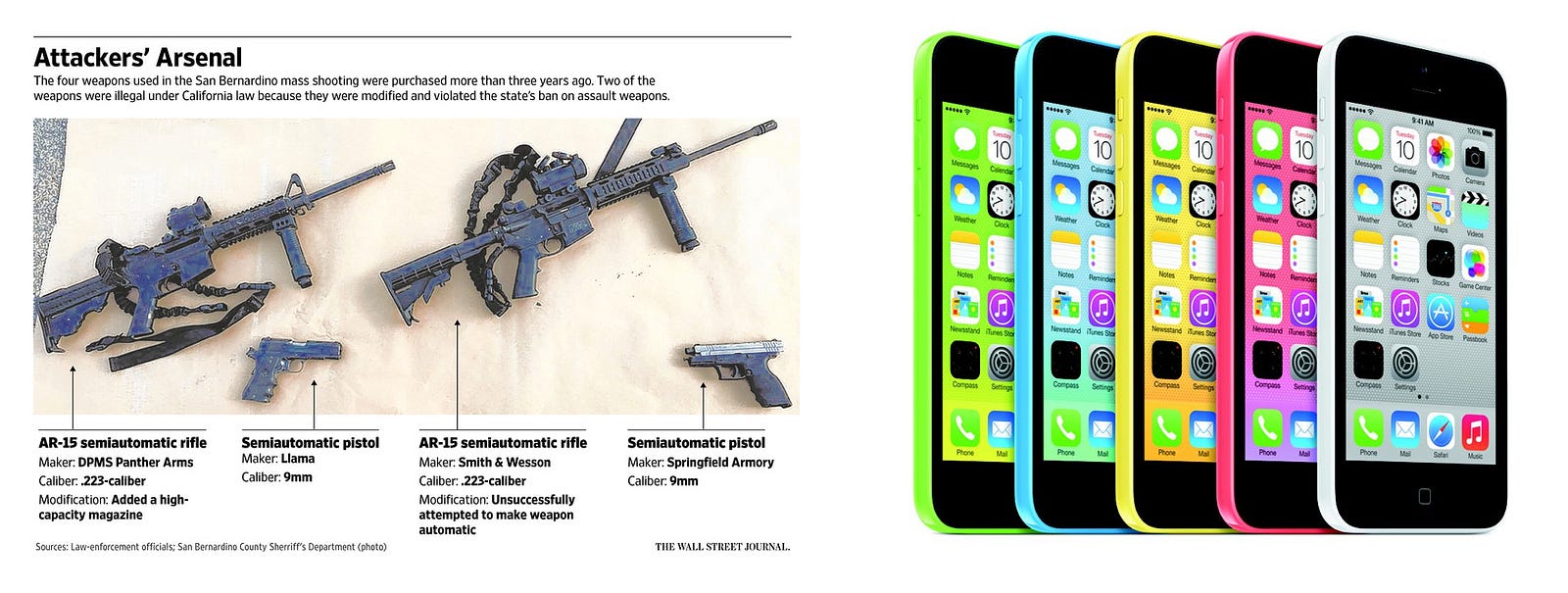Last week, Apple’s Tim Cook published a letter to its customers explaining why they plan to fight the FBI’s request to compel Apple to unlock an iPhone used by the San Bernadino terrorist attackers:
Specifically, the FBI wants us to make a new version of the iPhone operating system, circumventing several important security features, and install it on an iPhone recovered during the investigation. In the wrong hands, this software — which does not exist today — would have the potential to unlock any iPhone in someone’s physical possession.
The FBI may use different words to describe this tool, but make no mistake: Building a version of iOS that bypasses security in this way would undeniably create a backdoor. And while the government may argue that its use would be limited to this case, there is no way to guarantee such control.
I’ve been thinking about how odd this case is and watching all the think pieces being written on all the precedence this would set in American law. All the arguments and articles to date have focused on the potential legal outcome and the impact on civil liberties not only in America but internationally.
I’ll first point out that 2 individuals in San Bernadino, California, purchased guns and ammunition and killed and maimed a lot of innocent people. But the FBI’s response is to basically blame Apple for not building a back door it can use to access personal cell phones in investigations. I had been thinking along these lines but hadn’t seen articulated quite as cogently as James Allworth’s post on Medium (apparently everyone publishes to Medium these days), titled “The U.S. has gone F&*%ing Mad”
On December 2, 2015, an absolute tragedy occurred. 14 Americans were killed and 22 were seriously injured in a mass shooting in San Bernardino.
Which of the following would you attribute responsibility for what happened:
Let me give you a hint. It’s not the one that comes in five flavors.
Next question: in the wake of San Bernadino, which one is the US Government going after?
Although Apple is a US company, it’s software and hardware are used worldwide. And Apple prides itself on being the most secure mobile platform on the market. It builds (as far as we know) a singular software stack for its two product lines (MacOS for desktop-class devices and iOS for mobile devices), differentiated by language around the world. Apple’s software security is built in such a way that the customer has control over their data. If you are unable to retrieve your password for any reason, there’s little to nothing that Apple can do to help you or anyone else attempting to gain access to your information.
If Apple’s software was built in such a way that anyone with the right tools could access your personal information, then activists the world over would be in danger in repressive regimes (think Egypt, China, Ethiopia, and yes, my very own Uganda).
The Ugandan government banned the use of social media sites during the recently concluded elections (local and district-level elections were held today). However, enterprising Ugandans (including several opposition candidates) displayed collective disobedience by installed VPN software en masse (estimates ranged from just over half a million installs to as wide as over 1.5 million private installations of Virtual Private Networks) to get around the block of access to Facebook, Twitter, and WhatsApp.
I don’t have the numbers for iOS or MacOS installations in the country but a scan across this cafe indicates there’s a fair amount of them equally spread between expats and locals. It is easy to imagine that if any one of them that defied the social media ban and installed VPN on their devices and the government got access to their (our) devices, identifying them would be easy.
If the Ugandan Communications Commission has the ability and sophistication to shut down access to specific sites, we can assume they have access to equally sophisticated software that could target anyone they wanted. The outcome of the FBI vs Apple has legal and personal safety implications around the world. Technology erases borders (no matter how many times Western media houses attempt to region block online content (VPN to the rescue!). How are Ugandans supposed to watch Trevor Noah make hilarious comparisons between Donald Trump and Museveni?).
But as technology erases borders and unifies, it can serve to either strengthen or weaken the human rights of its users. Privacy is a human right, it is just protected differently around the world. Apple’s technology allows for the strengthening of the privacy of its users around the world. The outcome of this FBI vs Apple case could either strengthen or single-handedly be the greatest threat to global human rights. If Apple is compelled to build a backdoor, then it would set precedent that would require ALL manufacturers to weaken the encryption of software.
I am of the view that Apple, on two fronts, should not only defy the FBI’s request, but also refocus what this case should really be about. Far be it for me to tell a multi-billon dollar company what to do with its vast cash reverses, but a billion dollars donated to the Electronic Frontiers Foundation (EFF) and the weak anti gun lobby would neatly refocus this fight right where it should belong.








